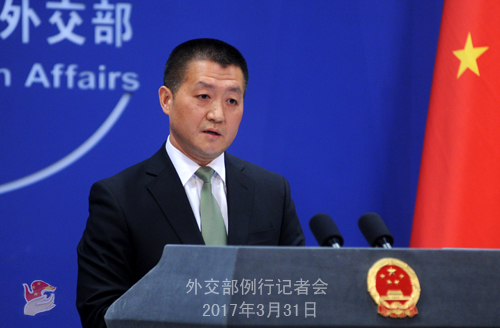Indian wanderings of the Dalai Lama
- By Sabena Siddiqui
 0 Comment(s)
0 Comment(s) Print
Print E-mail China.org.cn, April 1, 2017
E-mail China.org.cn, April 1, 2017
|
|
|
Foreign Ministry Spokesperson Lu Kang speaks at a regular press conference on March 31, 2017. [Photo/Website of Ministry of Foreign Affairs] |
The Indian-sponsored visit of the Dalai Lama to Arunachal Pradesh, in the far northeast of the country, is due to start on April 5 at the formal invitation of the state's Chief Minister Pema Khandu.
Given the controversy this is already provoking, it's quite unclear what India wants to achieve by issuing such an invitation.
China claims a good part of the territory, calling it South Tibet, and has never accepted its loss under the terms of the Simla Accord (1914). This includes the disputed Tawang district, and only the other day, the prominent Tibetan scholar, Lian Xiangmen, declared: "Tawang is a part of Tibet and Tibet is a part of China. There is no problem here."
Tawang Monastery, it should be noted, is an important one in Tibetan Buddhism.
It was obvious that any Indian attempts to host the Dalai Lama would be considered "unfriendly" in Beijing with direct impact on the Sino-Indian border dispute.
Notwithstanding all these historical facts, the Indian government continues to support and arrange visits by the Tibetan separatist leader exiled since 1959, who last visited Tawang in November 2009. His new visit suggests that India continues to back his secessionist policies towards China.
Indeed, India has always been very supportive of the Dalai, who, on one occasion, even referred to himself as a "son of India."
This visit stunt can be seen as a deliberate snub when it is widely known that China disapproves of any visits by foreign officials to the disputed territory, like last year when the U.S. sent its ambassador in New Delhi, Richard Verma, to visit Arunachal Pradesh.
Just recently, the U.S. refused to give visas to a "Tibetan" women's soccer team bearing Indian passports, apparently because it did not want to get further involved in the issue.
Meanwhile, Indian President Pranab Mukherjee even held a reception for the Dalai Lama last December, marking the latter's first meeting with an Indian head of state in 60 years.
It certainly looks like the India is trying to secure concessions in Southern Tibet by promoting the interests of the separatist leader.
In reality, the culture furthered by the Dalai Lama was actually used as a tool of suppression for thousands of years to enslave ordinary people spiritually and physically in both Tibet and China.
Historically, proponents of the Dalai creed had only raided Chinese cities in the past; now the same decadent practices are being used for seditious agenda under the pretence of victimization. Over the years, the Dalai Lama, having been given a Nobel Peace prize, has persisted in demanding "autonomy" of Tibet. Obeying orders, his followers often go for self-immolation to keep his separatist agenda alive.
China claims 90,000 sq. km in Arunachal Pradesh now in India's possession while India claims 38,000 sq. km of the Aksai Chin territory in China. The region is India's only gateway to Central Asia since the British partition of the subcontinent in 1947, and the territorial dispute led to a brief war with China in the area in 1962.
Dai Bingguo, a top retired Chinese diplomat has suggested that the issue be resolved on a reciprocal basis, "The disputed territory in the eastern sector of the China-India boundary, including Tawang, is inalienable from China's Tibet in terms of cultural background and administrative jurisdiction."
Seeing that even the British had accepted Tawang as part of Tibet, if India assented to a reciprocal action, China would accede part of Aksai Chin, he said. In fact, in 2005, Dai had drafted an agreement regarding the boundary dispute.
The Sino-Pakistan Frontier Agreement in 1963 adopted the same approach, with China ceding over 1,942 sq. km.of territory to Pakistan and the latter recognizing Chinese sovereignty over hundreds of sq. km. of land in Northern Kashmir and Ladakh.
As India does not recognize the legality of this agreement, it's highly unlikely it will make any concessions regarding Arunachal Pradesh.
In October 2016, Chinese Foreign Ministry spokesperson Lu Kang warned, "We require the Indian side to honour the political commitment on Tibet-related issues and abide by the bilateral consensus on boundary question, refrain from taking any action that may complicate the issue, do not provide any platform for anti-China separatist activities by the 14th Dalai Lama."
When the Indian author and former diplomat Vikas Swarup said the Dalai Lama had visited Arunachal Pradesh previously, Kang responded: "Making one mistake doesn't mean you can make another."
Still, for India, it seems being on good terms with the Dalai Lama is more important than relations with China.
Sabena Siddiqui (Twitter: @sabena_siddiqi) is a foreign affairs journalist and lawyer based in Pakistan.
Opinion articles reflect the views of their authors, not necessarily those of China.org.cn.







Go to Forum >>0 Comment(s)